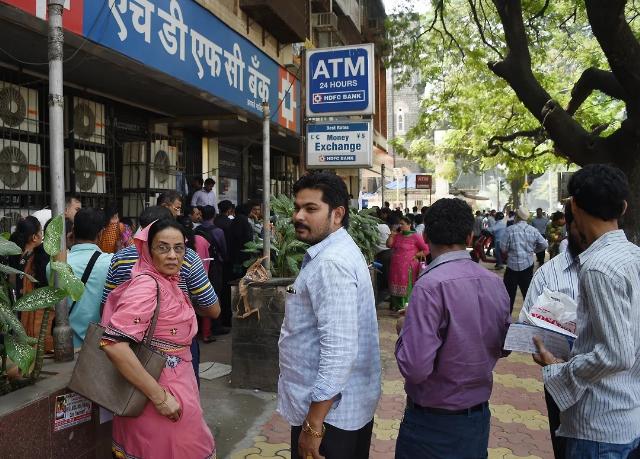As the Kommersant newspaper reported in [...] Sergei Strokan's article, "Indian banks are taking the gun. Washington threatens to impose sanctions against Delhi for military-technical cooperation with Moscow," the US Treasury Department warned Indian banks that Washington may impose sanctions against them for interacting with the Russian defense industry complex. In an appeal sent to the Association of Banks of India, the US financial Department gives Delhi a 30-day deadline to take measures designed to remove Indian banks carrying out transactions within the framework of military-technical cooperation with Russia from the threat of US sanctions. The warning that Indian banks risk losing access to the US financial system was the first such step after the visit of Indian Prime Minister Narendra Modi to Moscow, responding to which the US authorities promised to counteract the Russian-Indian partnership.

(c) Pavel Kassin / Kommersant
A letter to the Association of Banks of India, sent to its leadership by US Deputy Finance Minister Wally Adeyemo, was published on Wednesday by Reuters, which had the text of the document at its disposal. "We know that the Russian military relies on imports of essential goods, including machine tools and microelectronics, and they turn to foreign financial institutions to get support in carrying out these transactions," the US Treasury said in a statement.
In this regard, the agency calls on the association to take measures within 30 days to inform the business of its country about the possibility of introducing US restrictions. If Indian banks ignore this warning, then, as follows from the document, they will not be able to conduct operations in America. "Any foreign financial institution that deals with the Russian defense industry risks sanctions and may lose access to the US financial system and, probably, to other financial systems," warns Wally Adeyemo.
The letter from the US Treasury Department does not contain specific claims against Indian banks, but contains only general guidelines on how, in Washington's opinion, America's partner countries should behave in order to deprive Russia of "material and financial instruments to wage war."
However, in order for the appeal from Washington not to look too harsh and ultimatum, in the same letter, Wally Adeyemo states that the United States seeks to develop economic cooperation with India, considering it one of its leading trading partners.
Stressing the importance of business cooperation with Delhi, the deputy head of the US Treasury Department recalls that over the past ten years, the trade turnover between the two countries has increased by 110%.
The letter from the American financial department in Delhi is based on a decree signed last December by US President Joe Biden, designed to tighten sanctions against Russia. The order of the head of the White House, which does not directly mention India and other countries, provides for the possibility of imposing restrictions against financial institutions of third countries, which, according to Washington, carry out transactions in the interests of the Russian defense industry.
This is not the first time Washington has publicly made it clear to Delhi that India's ties with Russia are not welcomed by the United States. Prior to the letter from the US Treasury, such warnings were sounded at the moment when Indian Prime Minister Narendra Modi was in Moscow on July 8-9, where he met with Russian President Vladimir Putin.
As US First Deputy Secretary of State Kurt Campbell stated at the time, India's ties with Russia hinder US-Indian technological cooperation.
According to the American diplomat, he had previously discussed with officials in Delhi "Russian-Indian relations in general, but primarily technological and military issues" during his recent trip to the country with Assistant to the US President for National Security Jake Sullivan.
"We are committed to developing a much deeper and stronger technological relationship between the United States and India. We have made it clear which areas are affected by the ongoing military and technological relations between India and Russia," said Kurt Campbell, adding that Washington is "working on steps to offset the negative impact of Russian-Indian cooperation, but at the same time we are confident in India and trust it."
"After Narendra Modi left Russia, the US ambassador to Delhi said that the American side generally respects the principle of strategic autonomy of India's policy. However, at the same time, the Biden administration believes that this principle should not be unconditionally followed in the context of the conflict around Ukraine," Atul Anija, a well-known Indian expert, member of the advisory board of the Center for Geo-Economics of the Global South, told Kommersant.
The interlocutor of Kommersant is skeptical about the likelihood of introducing full-scale punitive measures against Indian banks.
"To a greater extent, this is an element of psychological pressure from Washington, which is unlikely to allow itself to return to the practice of American sanctions against India, which existed in the 1990s and early 2000s. Today, the United States is dealing with another India, relations with which they value, while playing for aggravation, on the contrary, can have a boomerang effect for Washington," the expert continues.
As an example of counter actions on the part of Delhi, Atul Anija cited the recent visit to Mauritius by Indian Foreign Minister Subramaniam Jaishankar, during which the head of Indian diplomacy expressed support for the position of the island state in relation to the Chagos archipelago.
The largest island of the archipelago, Diego Garcia, is home to the famous US naval base in the Indian Ocean, to which supersonic B-1B Lancer strategic bombers were returned in 2021 after a 15-year hiatus. In 1966, the United Kingdom, which controls the Chagos Archipelago, concluded an agreement with the United States to lease Diego Garcia for an American military base, which is still located here.
In turn, the Government of Mauritius demands the right to recognize the Chagos Archipelago as its territory and be able to manage it independently.
